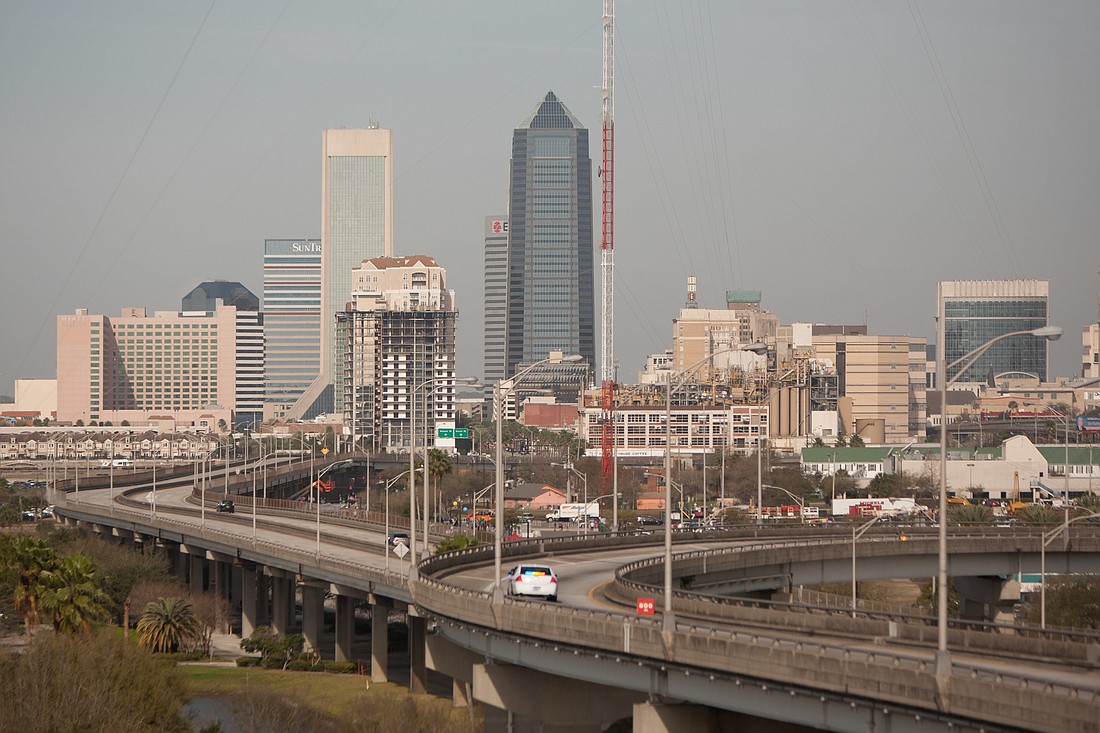
The city of Jacksonville will seek contractors in January to dismantle the elevated highway ramps that connect the Hart Bridge to Downtown.
According to Mayor Lenny Curry’s office, the request for qualifications will be issued in January in the hope of securing a design-builder by the end of 2019.
It’s one of several required steps before the city can start the project in the next two years.
The Curry administration considers removing the elevated roads as necessary to improve freight traffic in the Talleyrand area. It also could benefit Jacksonville Jaguars owner Shad Khan, who wants to pursue a multibillion-dollar mixed-use project along the Downtown Northbank.
City spokeswoman Tia Ford said the city is developing a design criteria package for the project, which will outline the technical and design requirements.
Contractors who respond to the RFQ will need to provide and explain their relevant experience, financial capacity to complete the project, examples of similar work and other information.
A draft of the RFQ was not available.
Contractors will be scored based on qualifications.
The top-scoring companies will be encouraged to submit responses to a request for proposals, which likely would be issued after July or August.
Legislation was introduced Tuesday to Jacksonville City Council seeking to appropriate a $12.5 million grant from the Florida Department of Transportation.
The funds match what’s been allocated in the city’s Capital Improvement Program.
The city would remove a half-mile-long stretch of elevated roadways between A. Philip Randolph Boulevard and Festival Park Avenue.
A new grade-level ramp will be installed near Festival Park Avenue for traffic entering and exiting the Hart Bridge.
Another section of the expressway that routes traffic to and from Gator Bowl Boulevard and East Duval, Monroe, Adams and Forsyth streets would remain.
The city also is pursuing a $12.5 million federal grant to begin a second phase eventually that would expand and widen East Bay Street.
Curry’s Chief of Staff Brian Hughes said previously the project will begin with or without federal funding.
Removing the highways and reconfiguring Gator Bowl Boulevard is estimated to take 18 months.
“However, this time frame can be somewhat lengthened or shortened depending on the selected design-builder’s design and construction schedule response in its proposal,” Ford said.
It is unclear when lane closures could begin.
For the next six months, the city of Jacksonville will not issue certificates of use and will withhold other approvals for internet cafes.
The move is in response to the growing number of the establishments opening across Duval County that possibly violate state law, which bans adult arcades.
The bill passed as part of the consent agenda during the council’s bimonthly meeting.
Bills on the consent agenda are adopted as a group after they’ve received unanimous support in standing council committees.
District 2 council member Al Ferraro introduced legislation in October and held public meetings to discuss the approval pause.
He said his constituents and those in other districts are concerned the businesses are attracting crime and contributing to unhealthy habits like illegal gambling.
“We may not be able to shut them down, but we can stop others from opening,” he said.
The problem, according to Ferraro, is that new internet cafes may be a front for adult arcades, where customers gamble money by playing games of chance.
Internet cafes allow customers to purchase time on a computer terminal to access the web and play web-based games of skill.
Games of chance, like slot machines, are allowed only at state-approved casinos or racetracks, or if they’re located on Indian reservations. Other card games are allowed at other licensed facilities.
Ferraro said he believes some of the existing facilities are operating without a COU, which typically isn’t discovered until a complaint is filed or an annual inspection requires the fire marshal to check for one.
When businesses apply for a COU, they sign an affidavit stating the business will operate legally.
Of the estimated 140 applications submitted to the city since 2016, the Planning and Development Department said 90 have been approved.
City officials believe more are operating.
Council members began regulating internet cafes through legislation in 2009. State law pre-empts local regulations, meaning the city’s hands are tied because operating an adult arcade is now a criminal matter.
Ferraro plans to spend the next six months working with the city’s Planning and Development Department to restrict the business through zoning and possibly by other ways.
Those restrictions could include banning internet cafes from being too close to schools and churches, limiting the number of cafes within a certain geographic area and other changes.
He expects legislation to be created before the moratorium ends next summer.